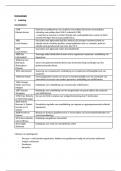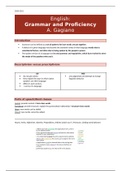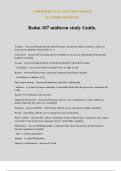1. The Expression of Future Time (5) (Units 1 – 4 of E1SA)
Future Simple: WILL/SHALL + infinitive
- FORM
o he WILL LEAVE early
o she SHALL WIN this game
- USE
1) Prediction
o weather forecasts
o speculations in general
o statements of cause and effect, based on guesswork, experience or expertise
(+ disjuncts expressing degrees of certainty: probably, persumably, …)
2) Unpremeditated intention
on the basis of a trigger in the present, the speaker decides to carry out a
future action/expresses his or her volition to do smth
e.g.: *doorbell rings* - I’ll answer it.
- NOTES
o “Will you leave soon?”: will can be interpreted in two way
purely informative about the adressee’s future plans
as a request by the speaker
o predictive force of ‘will’ is weakened in a sentence like “I’ll be 20 tomorrow”
Ik word morgen 20
o ‘will’ predicts that something may bet he case in the present/a strong
assumption: “You’ll probably already know”
o Will/shall is also used in type 1 conditional clause
o Will/shall has modal meanings:
a timeless prediction or general truth: Oil will float on water
a habitual prediction: He will sit there for hours doing nothing
,Future Perfect: WILL/SHALL + perfect infinitive
- FORM
o he WILL HAVE LEFT by then
o she WILL HAVE SPENT a lot of money
- USE
1) Indicating that a certain event/action/state will have been completed before or
continue up to (possibly overlapping with) a certain POINT IN TIME
(that PIT will tend to be in the future)
o I expect uncle Harry will have received my postcard before/when i get home
o He will have spent 40 years in jail by the time he gets out.
o Imagine how much the world will have changed by then
- NOTES
o In some cases, the PIT can also be the moment of speaking
Let’s call on him. He will have received our message (by now).
o In these cases, the Future Perfect also express a strong assumption about the
outcome of an earlier/past activity that has already been completed at the
time of speaking.
If we remove the modal meaning of strong assumption (will), we’re left with
an ordinary present perfect:
He has received our message (= established fact)
Future Progressive: WILL/SHALL + progressive infinitive
WILL/SHALL + be + base + -ing
- FORM
o he WILL BE SAILING
o he SHALL BE DOING that
- USE
1) Indicating that an action/event or state will be taking place at a certain moment
in the future, and focuses on DURATION
2) Progressive element ‘be + base-ing’: limited duration and/or incompleteness
3) Future progressive indicates that the speaker wants to avoid showing
involvement, commitment or personal intentions the non-commitment
future
o The shop will be closing in 10 minutes. (vs. I will close the shop in 10 min.)
4) Future progressive can be used to express what will have as a matter of course,
i.e. in the normal course of events (bc things have been PLANNED)
o When will you be moving?
o What we shall be doing next is …
o In a few minutes, we shall be climbing
(= as a part of the scheme)
, 5) Future progressive can be used to sound more polite
o Will you be staying long? (vs. Will you stay long?)
o Will you be putting on another record soon? - PRESSURE
Will you put on antoher record soon? + PRESSURE
6) Future progressive can be used as the colloquial equivalnt of Dutch ‘…zal nog
eens…’
o You will be losing your head one of these days.
o Je zult nog eens je hoofd verliezen
Straks verlies je je hoofd nog.
Future Perfect Progressive: WILL/SHALL + perfect progressive infinitive
WILL/SHALL + have + been + base + -ing
- FORM
o By 8 o’clock they WILL HAVE BEEN DRIVING for 48 hours
o He WILL HAVE BEEN SLEEPING late again
(Hij zal wel weer te lang hebben geslapen)
- USE
1) Indicating that by a precise moment in the future something will have been
going on interruptedly for a certain period
o By 8 o’clock tonight they will have been driving for 48 hours
2) strong assumption about the indefinite past is present
(will does NOT refer to the future, but it expresses modal meaning)
o He will have been sleeping late again
Be going to + infinitive
- FORM
o I am going to ask her
o She is going to mow the grass
o They are going to be fine
- USE
1) A present premeditated intention to carry out a future action – with a strong
degree of certainty (= ‘intend to’) + HUMAN SUBJECT
o I am going to ask her to marry me
o I am going to be a fireman when I grow up
(vs. ‘will’ = unpremeditated intention)
*phone rings*
o I am going to answer it premed. intention
o I will get it unpremed. intention/spontaneous response
, 2) A future event which is suggested by present signs/cause
o He looks really pale. He’s going to be sick.
o Look at his face. He’s going to start laughing any second now.
o Watch it! That bomb is going to explode.
- NOTES
o combined with a past form of ‘be’, the ‘going to’ form acts as a future
resulting from a past intention
The shopkeeper was going to sue me, but i persuaded him not to.
o the ‘going to’ form is hardly compatible with certain verbs, e.g. stative verbs,
because they have a feature
I will know soon (=predicative)
Present Progressive
- FORM
o = be + base + -ing
o I am getting married this spring
o What are you doing tonight
- USE
1) To refer to future events resulting form a present plan, programme or
arrangement
o John is rising at 5 o’clock tomorrow. an arrangement
o The sun rises at 5 o’clock tomorrow. not an arrangement
2) Involves conscious human agency
o The do’er is a human
3) Pres. Progr. can also be used to refer to an arranged future that is imminent or
near
o The Smiths are leaving soon
- NOTES
o Difference between ‘going to’ and ‘Pres. Prog.’ for future time reference can
be very small at times
I am taking Mary out to dinner tonight
= arrangement
Mary knows
I am going to take Mary out to dinner tonight
= premeditated intention
Mary may not know yet
Future Simple: WILL/SHALL + infinitive
- FORM
o he WILL LEAVE early
o she SHALL WIN this game
- USE
1) Prediction
o weather forecasts
o speculations in general
o statements of cause and effect, based on guesswork, experience or expertise
(+ disjuncts expressing degrees of certainty: probably, persumably, …)
2) Unpremeditated intention
on the basis of a trigger in the present, the speaker decides to carry out a
future action/expresses his or her volition to do smth
e.g.: *doorbell rings* - I’ll answer it.
- NOTES
o “Will you leave soon?”: will can be interpreted in two way
purely informative about the adressee’s future plans
as a request by the speaker
o predictive force of ‘will’ is weakened in a sentence like “I’ll be 20 tomorrow”
Ik word morgen 20
o ‘will’ predicts that something may bet he case in the present/a strong
assumption: “You’ll probably already know”
o Will/shall is also used in type 1 conditional clause
o Will/shall has modal meanings:
a timeless prediction or general truth: Oil will float on water
a habitual prediction: He will sit there for hours doing nothing
,Future Perfect: WILL/SHALL + perfect infinitive
- FORM
o he WILL HAVE LEFT by then
o she WILL HAVE SPENT a lot of money
- USE
1) Indicating that a certain event/action/state will have been completed before or
continue up to (possibly overlapping with) a certain POINT IN TIME
(that PIT will tend to be in the future)
o I expect uncle Harry will have received my postcard before/when i get home
o He will have spent 40 years in jail by the time he gets out.
o Imagine how much the world will have changed by then
- NOTES
o In some cases, the PIT can also be the moment of speaking
Let’s call on him. He will have received our message (by now).
o In these cases, the Future Perfect also express a strong assumption about the
outcome of an earlier/past activity that has already been completed at the
time of speaking.
If we remove the modal meaning of strong assumption (will), we’re left with
an ordinary present perfect:
He has received our message (= established fact)
Future Progressive: WILL/SHALL + progressive infinitive
WILL/SHALL + be + base + -ing
- FORM
o he WILL BE SAILING
o he SHALL BE DOING that
- USE
1) Indicating that an action/event or state will be taking place at a certain moment
in the future, and focuses on DURATION
2) Progressive element ‘be + base-ing’: limited duration and/or incompleteness
3) Future progressive indicates that the speaker wants to avoid showing
involvement, commitment or personal intentions the non-commitment
future
o The shop will be closing in 10 minutes. (vs. I will close the shop in 10 min.)
4) Future progressive can be used to express what will have as a matter of course,
i.e. in the normal course of events (bc things have been PLANNED)
o When will you be moving?
o What we shall be doing next is …
o In a few minutes, we shall be climbing
(= as a part of the scheme)
, 5) Future progressive can be used to sound more polite
o Will you be staying long? (vs. Will you stay long?)
o Will you be putting on another record soon? - PRESSURE
Will you put on antoher record soon? + PRESSURE
6) Future progressive can be used as the colloquial equivalnt of Dutch ‘…zal nog
eens…’
o You will be losing your head one of these days.
o Je zult nog eens je hoofd verliezen
Straks verlies je je hoofd nog.
Future Perfect Progressive: WILL/SHALL + perfect progressive infinitive
WILL/SHALL + have + been + base + -ing
- FORM
o By 8 o’clock they WILL HAVE BEEN DRIVING for 48 hours
o He WILL HAVE BEEN SLEEPING late again
(Hij zal wel weer te lang hebben geslapen)
- USE
1) Indicating that by a precise moment in the future something will have been
going on interruptedly for a certain period
o By 8 o’clock tonight they will have been driving for 48 hours
2) strong assumption about the indefinite past is present
(will does NOT refer to the future, but it expresses modal meaning)
o He will have been sleeping late again
Be going to + infinitive
- FORM
o I am going to ask her
o She is going to mow the grass
o They are going to be fine
- USE
1) A present premeditated intention to carry out a future action – with a strong
degree of certainty (= ‘intend to’) + HUMAN SUBJECT
o I am going to ask her to marry me
o I am going to be a fireman when I grow up
(vs. ‘will’ = unpremeditated intention)
*phone rings*
o I am going to answer it premed. intention
o I will get it unpremed. intention/spontaneous response
, 2) A future event which is suggested by present signs/cause
o He looks really pale. He’s going to be sick.
o Look at his face. He’s going to start laughing any second now.
o Watch it! That bomb is going to explode.
- NOTES
o combined with a past form of ‘be’, the ‘going to’ form acts as a future
resulting from a past intention
The shopkeeper was going to sue me, but i persuaded him not to.
o the ‘going to’ form is hardly compatible with certain verbs, e.g. stative verbs,
because they have a feature
I will know soon (=predicative)
Present Progressive
- FORM
o = be + base + -ing
o I am getting married this spring
o What are you doing tonight
- USE
1) To refer to future events resulting form a present plan, programme or
arrangement
o John is rising at 5 o’clock tomorrow. an arrangement
o The sun rises at 5 o’clock tomorrow. not an arrangement
2) Involves conscious human agency
o The do’er is a human
3) Pres. Progr. can also be used to refer to an arranged future that is imminent or
near
o The Smiths are leaving soon
- NOTES
o Difference between ‘going to’ and ‘Pres. Prog.’ for future time reference can
be very small at times
I am taking Mary out to dinner tonight
= arrangement
Mary knows
I am going to take Mary out to dinner tonight
= premeditated intention
Mary may not know yet





